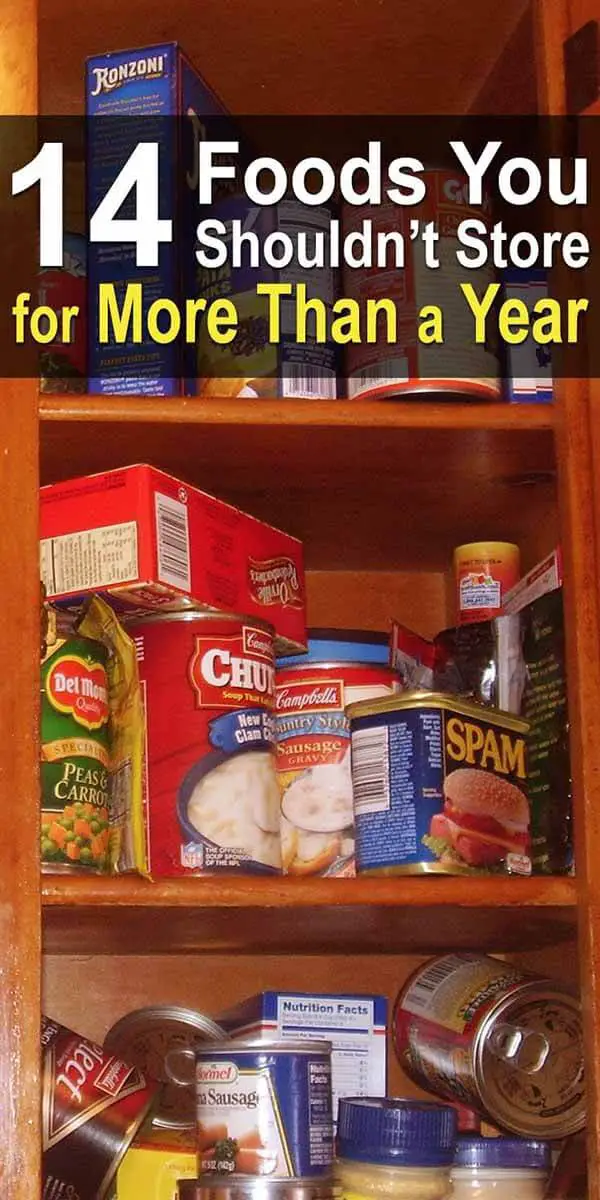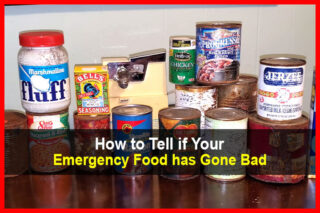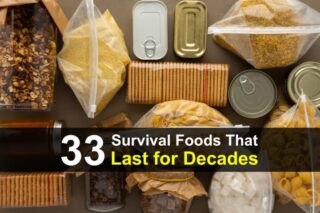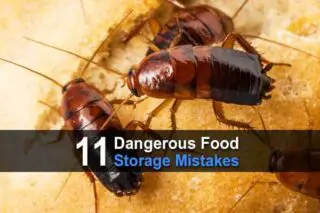Estimated reading time: 6 minutes

When you are setting up a survival pantry, you want to choose foods that will last. Stored properly, many foods – such as beans, pasta, and white rice – can last indefinitely without refrigeration. Other foods, however, can spoil or lose their taste in less than a year.
Here are 14 foods that do not store well for more than 12 months. Since many of these items are basics that you will want in your survival pantry, make sure you rotate them with fresh replacements every three to six months.
1. Flour All flours have a limited shelf life due to oxidation of the oils in the flour. Flour also is highly susceptible to bug infestations. The best place to store flour long-term is in the freezer. In the pantry, store flour in an airtight container in a cool, dry location. Dispose of any flour that has a stale or rancid odor or shows signs of bugs.
2. Brown Rice – Brown rice has a high oil content and therefore has a dramatically shorter shelf life than white rice when stored at room temperature. Store brown rice in the freezer or rotate it out of your pantry every three to six months.
3. Dried Fruit – You might think that died fruit will store for long periods, but it tends to harden in anywhere from 3 to 12 months, depending on the fruit and the storage conditions. For example, you need to rotate figs every three months, while raisins usually stay soft until about 12 months.
4. Canned Tomatoes – Due to their high acid content, canned tomato products usually have a shorter shelf life than other canned foods. Look for warning signs such as bulging, leaking, or dented cans, and dispose of any products that have a bad odor. You can avoid the problem associated with canned tomato products by rotating them every few months.
5. Canned Tuna – The flavor of canned tuna often deteriorates in long-term storage. One word to describe tuna that is stored for longer than a year is “mushy.” To extend shelf life, store your canned tuna in a dark, cool, and dry location. However, your best bet is to rotate the cans every 6 to 12 months or so.
6. Homemade Jerky – If you dehydrate your own meat, you know how inexpensive and great tasting homemade jerky is. However, homemade jerky does not last as long as store-bought jerky. The moisture content in store-bought jerky is controlled with industrial dehydrators, making commercial varieties safe for long-term storage. Homemade jerky, on the other hand, is susceptible to bacteria that survive the drying process. For best results, vacuum pack your homemade jerky and store it along with a silica gel packet to help absorb moisture.
7. Crackers – Even when they are left unopened in their cellophane wrapper and appear fine visually, graham and saltine crackers can become rancid in less than a year’s time. You can extend the shelf life of crackers by placing the original unopened packages in airtight containers or by repackaging the crackers in new vacuum-sealed packaging.
8. Breakfast Cereals – When left in their original packaging, breakfast cereals can become soft and stale. Place unopened bags of cereal in airtight containers or just be sure to rotate your cereal supply diligently.
9. Butter – Although butter lasts longer than many dairy products, even commercially canned butter can turn rancid on your survival pantry shelf. Rotate it regularly and completely avoid storing wrapped or home-canned butter at room temperature.
10. Cooking Oils – While sunflower seed oil, canola oil, safflower oil, blended vegetable oil, and olive oil can last for around two years or longer when stored unopened in original packaging, some oils are more delicate. Corn oil, sesame oil, and most nut oils have a shelf life of one year at the most when stored unopened. Smell oils before using them and discard if there is a foul odor or unusual color.
11. Peanut Butter – A good source of protein and potassium, peanut butter is a popular choice for the pantry. However, the oil in peanuts makes peanut butter susceptible to spoilage. All-natural peanut butter can maintain optimum quality for only about three months, and regular peanut butter stays in top condition for only about a year.
12. Nuts – Because of their convenience and their rich protein content, nuts are a good choice for survival food planning. However, nuts do not retain their freshness for long periods of time. How long can you store nuts? It depends on the variety. Pistachios last for only about three months, while almonds can stay fresh for up to a year. Be sure to rotate your nut supply accordingly.
13. Cornmeal – Rich in zinc and iron, cornmeal is a good choice for someone who is gluten intolerant. However, its long-term shelf life is only about 9 to 12 months. You can extend that time by storing it in its original unopened packaging place inside an airtight container.
14. Yeast – Plan to rotate your yeast supply every three to six months for best results.
The main thing to remember is that a survival pantry is not a one and done kind of deal. It takes planning and maintenance to be prepared in an emergency. Here are some additional tips:
- Label all canned, packaged, and bulk foods with the date of purchase and, if it is different, the date of storage.
- Routinely examine cans for signs of leakage or for bulging lids or sides. Dispose of any damaged cans.
- Buy what you eat. Even if it is on sale, avoid buying items that your family does not enjoy or routinely eat.
- Your storage space should be cool, dry, and well ventilated.
- Avoid light. Light, especially sunlight, degrades food and packaging material, so aim to keep your pantry as dark as possible.
- Eat what you buy. In other words, rotate your supply, using the “first in, first out” rule.
- Regularly check your pantry for cleanliness and any signs of damage or infestation.
Finally, keep in mind that fresh water is likely to be at a premium in a disaster situation, so limit the number of dehydrated and freeze-dried foods that require reconstitution.












Mylar and oxygen absorbers or vacuum sealed mylar nullifies almost everything in this article. Almost “anything” in a can will be fine as long as the can is not leaking or swollen and the contents smell okay. Usually “cheap” store brands are the most susceptible to these conditions. I have found that Walmart’s “Great Value” brand is as stable as the high priced brands. Very good quality and a great price. In over 20 years I have found “no” problems with canned tuna, beef, chicken, pork or ham. I recently opened a DAK canned ham that was 15 years old and it was absolutely perfect and delicious. My wife and I have been keeping long term foods storage for over 25 years and have had very little problems with anything. Keep the faith and God bless.
The article that linked to this one, 14 foods forgotten to save(or similar) by a person named Tricia, and this one, directly contradict each other on several of the foods. Peanut butter, tuna, etc. this one says it’s not long term food, the other one says it is.
I have used several of these that went well past the printed expiration date and had zero issues.
I really think the leaders of this site ought to be reviewing these better before posting them to the site, some of us are spending time and money trying to prep and research stuff.
Otherwise I do really appreciate this place for the most part, thank you.
The best preparation for ‘survival’ is still a decent hunting rifle. I’m VERY old, and have been through MANY difficulties. Every house used to have a high-powered rifle and a shotgun behind the kitchen door, and at the age of seven I started shooting rabbits for the pot. The rabbits have by-and-large gone (government policy) but I’ve long lived ‘offgrid’ and have kept the fridge stocked with other game: and sometimes thought that, given the overabundance of homosapiens, there’d always be food available. Meat is meat: and most meat carries the essential constituents needed for sustenance. Every other carnivore (including a million generations of our ancestors) survived accordingly. Bottom line: food (and water, which falls from the sky!) will never be a major concern. The first law of Evolution (and survival) is: Adapt or die.